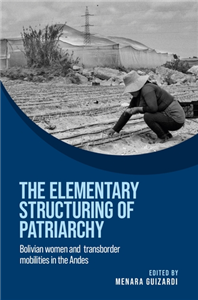The elementary structuring of patriarchy
Bolivian women and transborder mobilities in the Andes
by Menara Guizardi
Description
More Information
Rights Information
Albania, Algeria, Angola, Argentina, Armenia, Australia, Austria, Bahrain, Belgium, Belize, Benin, Bolivia, Bosnia and Herzegovina, Botswana, Brazil, Bulgaria, Burkina Faso, Burundi, Cameroon, Canada, Cape Verde, Central African Republic, Chad, Chile, China, Colombia, Comoros, Congo [DRC], Congo, Republic of the, Costa Rica, Ivory Coast, Croatia, Czech Republic, Denmark, Djibouti, Ecuador, Egypt, El Salvador, Equatorial Guinea, Eritrea, Estonia, Ethiopia, Faroe Islands, Finland, France, French Guiana, Gabon, Gambia, Georgia, Germany, Ghana, Greece, Guatemala, Guinea, Guinea-Bissau, Guyana, Honduras, Hongkong, Hungary, Iceland, India, Indonesia, Iran, Iraq, Ireland, Israel, Italy, Japan, Jordan, Kazakhstan, Kenya, Kuwait, Latvia, Lebanon, Lesotho, Liberia, Libya, Lithuania, Luxembourg, Macau, China, Macedonia [FYROM], Madagascar, Malawi, Malaysia, Mali, Malta, Mauritania, Mauritius, Mayotte, Mexico, Mongolia, Montenegro, Morocco, Mozambique, Namibia, Netherlands, New Zealand, Nicaragua, Niger, Nigeria, Norway, Oman, Pakistan, Panama, Paraguay, Peru, Philippines, Poland, Portugal, Puerto Rico, Qatar, Reunion, Romania, Russia, Rwanda, Saint Helena, Sao Tome and Principe, Saudi Arabia, Senegal, Serbia, Seychelles, Sierra Leone, Singapore, Slovakia, Slovenia, Somalia, South Africa, South Korea, Spain, Sri Lanka, Sudan, Suriname, Swaziland, Sweden, Switzerland, Syria, Taiwan, Tanzania, Thailand, Timor-Leste, Togo, Tokelau, Tunisia, Turkey, Uganda, Ukraine, United Arab Emirates, United Kingdom, United States, Uruguay, Venezuela, Vietnam, Western Sahara, Yemen, Zambia, Zimbabwe, South Sudan, Cyprus, Palestine, Bangladesh, Cambodia, Liechtenstein, Azerbaijan, Jamaica, Kyrgyzstan, Dominican Republic, Myanmar, Monaco
Endorsements
Based on an ethnographic study on the Andean Tri-border (between Chile, Peru, and Bolivia), this volume addresses the experience of Aymara cross-border women from Bolivia employed in the rural valleys on the outskirts of Arica (Chile's northernmost city). As protagonists of transborder mobility circuits in the Atacama Desert, these women are intersectionally impacted by different forms of social vulnerability. With a feminist anthropological perspective, the book investigates how the boundaries of gender are constructed in the (multi)situated experience of these transborder women. By building a bridge between classical anthropological studies on kinship and contemporary debates on transnational and transborder mobility, the book invites us to rethink structuralist theoretical assertions on the elementary character of family alliances. The women's life histories and the ethnographic data analyzed show that the limits of gender are configured as a triad between gender violence, kinship restrictions, and female mobility for the study's protagonists. This contributes to denaturalizing both the androcentrism of the classic arguments on kinship and the emphasis on the experiences of circulation of contemporary theories. Consequently, this book also contributes to the field of border studies by overcoming the insistent invisibility of the role of women in border regions through a model of analysis that privileges female discourses, experiences, affections, and practices. The book's focus on the reproductive tasks performed by the women allows a rethinking of the relationship between gender violence and female care as a key element to the survival of indigenous groups in border areas.
Reviews
Based on an ethnographic study on the Andean Tri-border (between Chile, Peru, and Bolivia), this volume addresses the experience of Aymara cross-border women from Bolivia employed in the rural valleys on the outskirts of Arica (Chile's northernmost city). As protagonists of transborder mobility circuits in the Atacama Desert, these women are intersectionally impacted by different forms of social vulnerability. With a feminist anthropological perspective, the book investigates how the boundaries of gender are constructed in the (multi)situated experience of these transborder women. By building a bridge between classical anthropological studies on kinship and contemporary debates on transnational and transborder mobility, the book invites us to rethink structuralist theoretical assertions on the elementary character of family alliances. The women's life histories and the ethnographic data analyzed show that the limits of gender are configured as a triad between gender violence, kinship restrictions, and female mobility for the study's protagonists. This contributes to denaturalizing both the androcentrism of the classic arguments on kinship and the emphasis on the experiences of circulation of contemporary theories. Consequently, this book also contributes to the field of border studies by overcoming the insistent invisibility of the role of women in border regions through a model of analysis that privileges female discourses, experiences, affections, and practices. The book's focus on the reproductive tasks performed by the women allows a rethinking of the relationship between gender violence and female care as a key element to the survival of indigenous groups in border areas.
Author Biography
Menara Guizardi is Adjunct Research of the National Council for Scientific and Technical Research of Argentina, linked to the Interdisciplinary School of Higher Social Studies of the National University of San Martín. She is also an associate researcher at the University of Tarapacá.
Manchester University Press
Manchester University Press is a leading UK publisher known for excellent research in the humanities and social sciences.
View all titlesBibliographic Information
- Publisher Manchester University Press
- Publication Date April 2024
- Orginal LanguageEnglish
- ISBN/Identifier 9781526176530 / 152617653X
- Publication Country or regionUnited Kingdom
- FormatPrint PDF
- Pages288
- ReadershipCollege/higher education; Professional and scholarly
- Publish StatusPublished
- Dimensions234 X 156 mm
- Biblio NotesDerived from Proprietary 6173
- SeriesWomen on the Move
- Reference Code16310
Manchester University Press has chosen to review this offer before it proceeds.
You will receive an email update that will bring you back to complete the process.
You can also check the status in the My Offers area

Please wait while the payment is being prepared.
Do not close this window.



